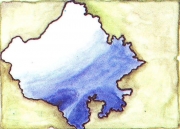Climate and Weather
The Himalayan glaciers controversy - An article in Ground Report India
Posted on 01 Mar, 2010 03:36 PMA huge controversy has been generated in recent days over the much quoted lines in the IPCC’s 2007 report: “Glaciers in the Himalaya are receding faster than in any part of the world and, if the present rate continues, the likelihood of them disappearing by the year 2035 and perhaps sooner is very high if the Earth keeps warming at the current rate” (Working Group 2, page 493). We do need to question how a statement of such magnitude, without peer review, made its way into the IPCC report. That it was discovered,externally, more than two years later raises concerns about both the mindset and the weakness of the processes of the IPCC in checking and correcting information they collate, information that is so vital in the global debate. However, to question the credibility of the science of the global warming, supported as it is by a wealth of empirical evidence, or to question IPCC’s work, as is happening in some quarters, is gross exaggeration and sometimes driven by dubious and malafide intentions.
Geology of India - DN Wadia - Macmillan publishers (1919)
Posted on 01 Mar, 2010 12:10 AMThe Geology of India by DN Wadia, a geologist with the Geological Survey of India, is considered to be one of the most important and complete reference works available today on the subject.
The book divides India into three main geological divisions - the triangular plateau of the peninsula, the mountainous or the extra-peninsular region bordering India on the west north and east, and the Indo-gangetic plain extending from the valley of the Indus to the valley of the Brahmaputra in Assam. The desert region of western Rajasthan is considered to be a unique fourth category, as it combines characteristics of two of the three main divisions.

Workshop on the theme "Ecological Agriculture practices as solution to Climate Change" , Patiala, Punjab
Posted on 17 Feb, 2010 05:20 PMSugarcane expert Shri Suresh Desai (from Belgaum, Karnataka) is visiting Punjab from March 1st to 4th, 2010. He will deliver lectures on water efficient sugarcane farming. The workshop will have practical sessions too.
Time : 09.30 AM to 03.30 PM
Address : Village Bhawalpur, Near Rajpura, District Patiala
Workshop on the theme "Ecological Agriculture practices as solution to Climate Change", Hoshiarpur, Punjab
Posted on 17 Feb, 2010 05:07 PMSugarcane expert Shri Suresh Desai (from Belgaum, Karnataka) is visiting Punjab from March 1st to 4th ,2010. He will deliver lectures on water efficient sugarcane farming. The workshop will have practical sessions too.
Time : 10.00 AM to 4.00 PM
Address : Ghaghial village, Hoshiarpur Dasuya Road, Hoshiarpur
Workshop on the theme "Ecological Agriculture practices as solution to Climate Change", Amritsar
Posted on 17 Feb, 2010 05:01 PMSugarcane expert Shri Suresh Desai (from Belgaum, Karnataka) is visiting Punjab from March 1st to 4th ,2010. He will deliver lectures on water efficient sugarcane farming. The workshop will have practical sessions too.
Time : 10.30 AM to 4.00 PM
Address : Bhagat Puran Singh Natural Farm , Dhirakot, Jandiala, Amritsar
Workshop on the theme "Ecological Agriculture practices as solution to Climate Change", Faridkot, Punjab
Posted on 17 Feb, 2010 04:46 PMSugarcane expert Shri Suresh Desai (from Belgaum, Karnataka) is visiting Punjab from March 1st to 4th ,2010. He will deliver lectures on water efficient sugarcane farming. The workshop will have practical sessions too.
Time : 10.00 AM to 4.00 PM
Address : Jaitu village, Gurmail Dhillon Natural Farm , Faridkot
Station-wise daily rainfall data for all districts of Rajasthan from 1973-2008
Posted on 11 Feb, 2010 05:32 PM The Water Resources Department of the Government of Rajasthan, has made available, station-level, daily rainfall data from 1973-2008, for all districts of Rajasthan, on its website.
The Water Resources Department of the Government of Rajasthan, has made available, station-level, daily rainfall data from 1973-2008, for all districts of Rajasthan, on its website.
In order to make this data of better value to end-users, the India Water Portal has extracted and made this data available in a district-wise spreadsheet format, which you can download with a single click.
While extracting the data, we observed some discrepancies in the master data on the website. These notes can be viewed here.
Conferernce on land-water resources, biodiversity and climate change, Bhopal School of Social Sciences, Bhopal
Posted on 10 Feb, 2010 01:38 PMThis is an International conference that intends to discuss the problems on water resources, biodiversity, climatic change and communicate the role of society in the present environmental scenario.
Organized by: The Bhopal School of Social Sciences,Bhopal, Madhya Pradesh, India
Conference on adapting water harvesting to climate change in dry lands of India, Jal Bhagirathi Foundation, Jodhpur
Posted on 29 Jan, 2010 03:35 PMThe Jal Bhagirathi Foundation has been working for the past eight years with programmes in the Marwar region of Thar Desert to empower distressed village communities enabling them to revive the traditional community management systems and practices with special focus on creating social capital as sustainable means for bringing water security.
Monthly magazine-Dams, Rivers & People, Sep-Oct 2009, Oct-Nov 2009, Dec 2009 - Jan 2010
Posted on 25 Jan, 2010 12:56 PM





